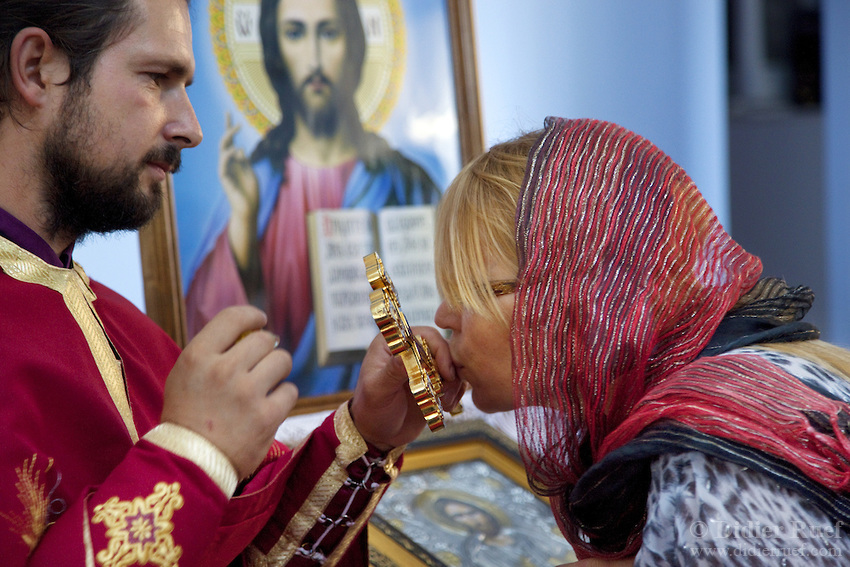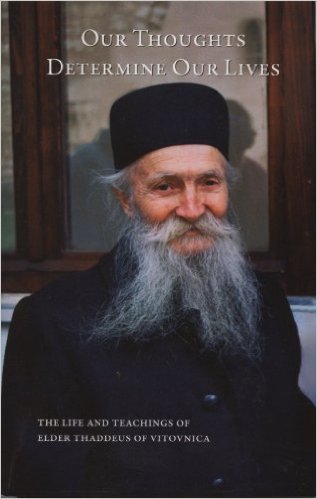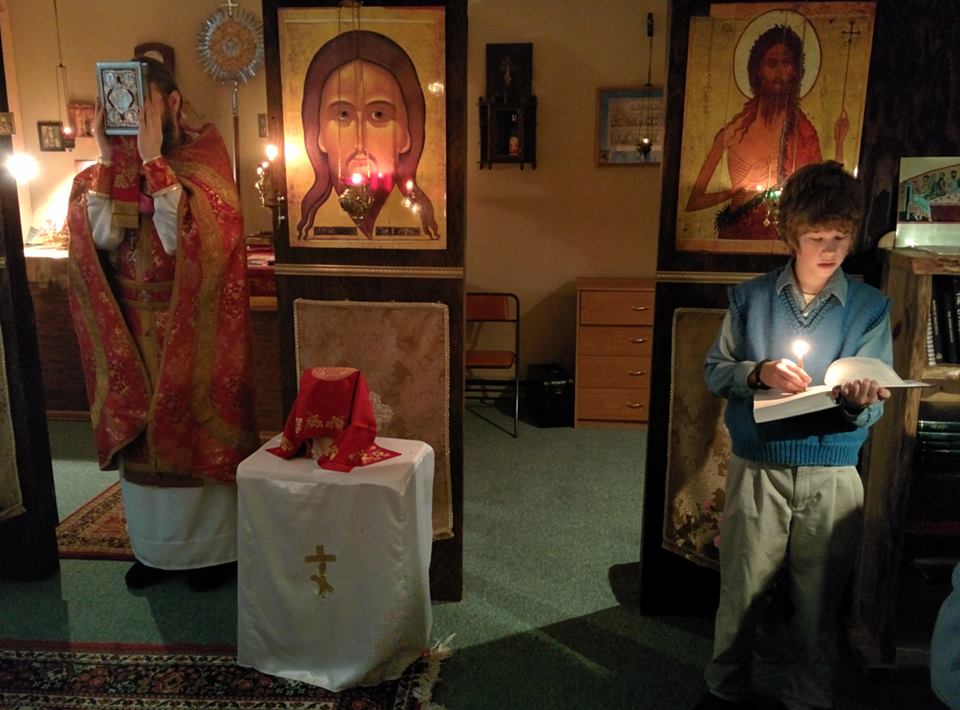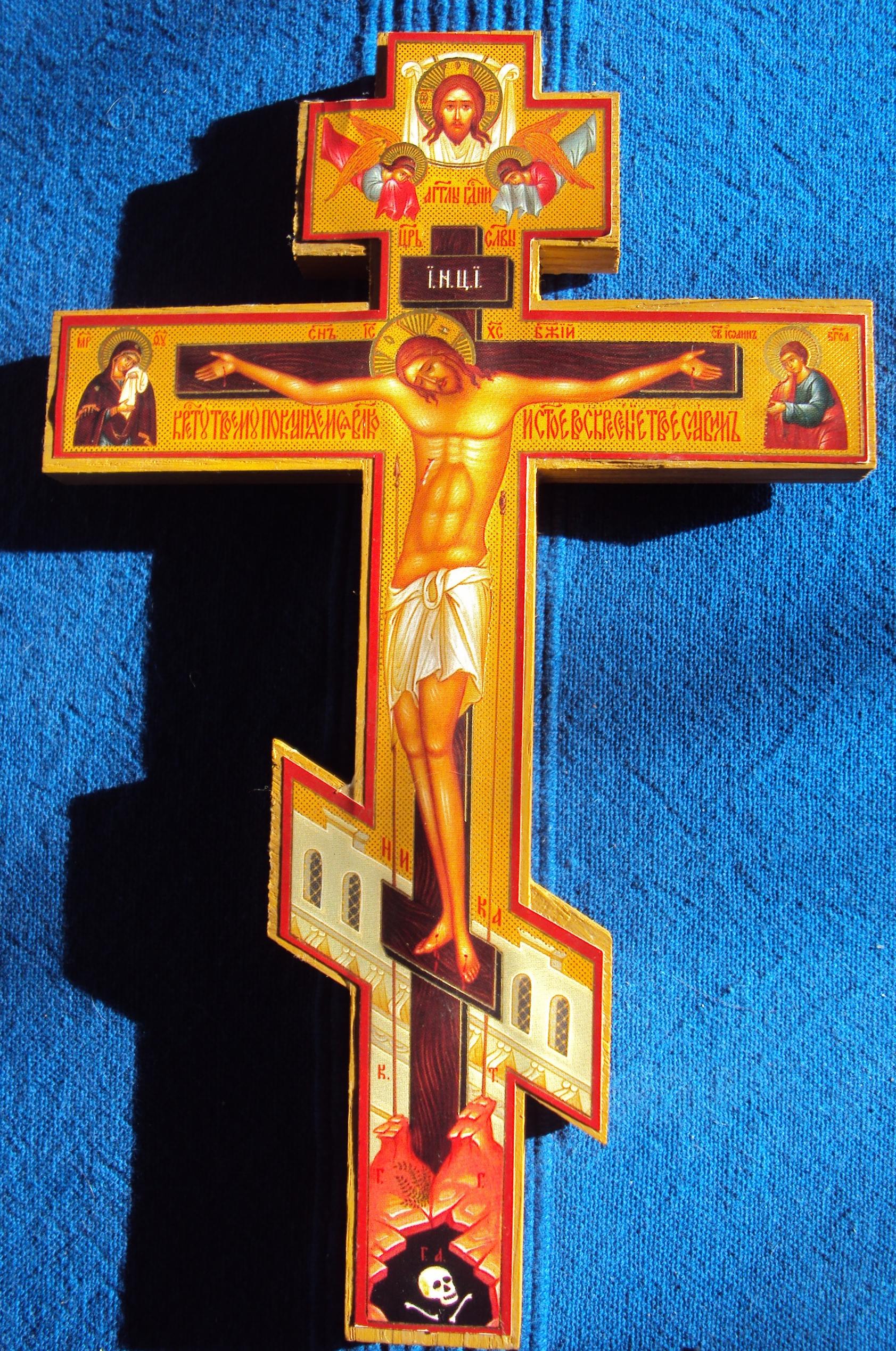 Every year the Orthodox church has a great feast for the Elevation of the Holy Cross. During this feast we process with the cross and kiss the cross and sing songs to the cross and venerate the cross (sometimes with Jesus painted on it). These acts of piety remind us that it was in the hour of Christ’s greatest weakness and humiliation that He purchased our salvation.
Every year the Orthodox church has a great feast for the Elevation of the Holy Cross. During this feast we process with the cross and kiss the cross and sing songs to the cross and venerate the cross (sometimes with Jesus painted on it). These acts of piety remind us that it was in the hour of Christ’s greatest weakness and humiliation that He purchased our salvation.
This year I was able to celebrate part of this season in a church that has wooden remnants that are pieces of the actual cross on which our Lord died.
 Something else that happened this year was I found myself wondering “Why didn’t we ever venerate the cross back when I was a Protestant?” I also found myself wondering why, when I was a Protestant, our church never encouraged us to wear crosses or crucifixes. I could think of nothing in Protestant theology that would obviously exclude these practices, since Protestants also hold a high view of the cross. So I did a little Google search on the topic and came across an interesting article by Tim Challies titled ‘Why You Should Not Wear a Crucifix.’
Something else that happened this year was I found myself wondering “Why didn’t we ever venerate the cross back when I was a Protestant?” I also found myself wondering why, when I was a Protestant, our church never encouraged us to wear crosses or crucifixes. I could think of nothing in Protestant theology that would obviously exclude these practices, since Protestants also hold a high view of the cross. So I did a little Google search on the topic and came across an interesting article by Tim Challies titled ‘Why You Should Not Wear a Crucifix.’
In this article, Challies quotes J.I. Packer who addressed this question. Packer regurgitated a lot of theories about the Second Commandment that many Protestant scholars are now having to recognize are without Biblical basis. But then I kept reading and I came across this interesting quote:
“The pathos of the crucifix obscures the glory of Christ, for it hides the fact of his deity, his victory on the cross, and his present kingdom. It displays his human weakness, but it conceals his divine strength; it depicts the reality of his pain, but keeps out of our sight the reality of his joy and his power. In both these cases, the symbol is unworthy most of all because of what it fails to display.”
On one level, Packer’s comments are completely understandable. After all, why would we want to have a symbol that reminds us of Christ’s crucifixion, His suffering, His human weakness, and His humiliation?
I would suggest that when we think about the cross with spiritual eyes, we see that it was precisely in the human weakness displayed on the cross that Christ’s strength was displayed; it was precisely in the pain and humiliation that Christ’s glory and deity were made manifest; it was through the divine humiliation that Christ’s glory shone.
If the crucifixion was just an unfortunate bit of human weakness that Jesus had to get out of the way in order to move onto the real action of His glory and power, then the cross should be an embarrassment to us or, as Packer puts it, “the symbol is unworthy”. However, the reason we can join Paul in boasting about the cross (Galatians 6:14) is precisely because it was in the humiliation, weakness, suffering and pain of crucifixion that Christ’s great glory, deity and victory over sin and death was made manifest.
This is a paradox that you need spiritual eyes to be able to grasp. To human reason it seems nonsense that it was through death that Christ defeated death, that it was in Christ’s greatest weakness that His greatest strength was made manifest, that it was through its apparent defeat that the Kingdom of God came to man, that it was through humiliation that Christ’s glory was displayed.
Without grasping this paradox, we cannot live a full Christian life. This is because we too are called to voluntarily embrace a life permeated by the qualities of humility, weakness, suffering and self-denial. If we do not understand the spiritual paradox of the cross, then we may see the qualities God calls us to exhibit as a bit of necessarily unpleasantness that bears no organic relation to the glory of redemption, or we may see these virtues as simply means to ends. In that case, we may end up like the philosopher Friedrich Nietzsche, who saw Christianity as antithetical to a fulfilled and vital life. Or we may end up seeing our Christian duties as obligating us to deny what is most fitting for our flourishing as fulfilled men and women, thus leading to the type of spiritual schizophrenia characteristic of the nominalist and non-teleological view of Christian ethics that I have been addressing elsewhere.
By contrast, what we learn from the cross is that it is precisely when God calls us to take up our cross and follow Jesus, it is precisely when we are called to voluntarily deny ourselves and suffer, it is precisely when following Jesus leads us into the way of pain and humiliation – it is precisely during these times that we are flourishing according to our nature, that we are building a weight of glory, that we are becoming more truly human. It is precisely these times of humiliation that we appropriate to ourselves Christ’s life-giving victory over sin and death.
Saint Paul articulated this principle when he described his own struggles to the Christians in Corinth. The blessed Apostle wrote:
“And He said to me, ‘My grace is sufficient for you, for My strength is made perfect in weakness.’ Therefore most gladly I will rather boast in my infirmities, that the power of Christ may rest upon me. For Christ’s sake, I delight in weaknesses, in insults, in hardships, in persecutions, in difficulties. For when I am weak, then I am strong ” (2 Corinthians 12:9-10)
This is the message of the cross, and that is why many Christians find it helpful to wear the cross, kiss the cross and sing to the cross. These practices are tangible reminders of the paradox that lies at the heart of the Christian faith, a paradox that our Lord hinted at when He said that those who were poor and mourned would be blessed (Matthew 5:3-4).
The Lord knows how hard it is for us to take up our cross and follow Jesus, and so He has made it easy for us. The Lord has put us in a world where we have myriad opportunities to be humbled every day and thus to bear our own crosses. Through the pain of ordinary life we learn to depend on God, we learn how little we can control the outcome of our lives, and we learn how unimportant we really are in the grand scheme of things. Only in this condition of humility, weakness, and sometimes even shame, can the power of Christ come to rest upon us.
Grasping this paradox can help us in the midst of difficult relationships. If there is someone at work, or at church, or in your family, who constantly humiliates you or tears you down or causes you to be continually confronted with your own fragility, weakness and vulnerability, should this be a cause of resentment or of joy? It should be a cause of joy insofar as such challenges can be seen as stepping-stones to greater humility. Anything that helps keep us humble is good since only through our humiliation can we identify with Christ’s victory and power. Elder Thaddeus of Vitovnica talked about this principle within the context of encouraging people to practice long-suffering in the face of misfortune and injustice.
“The Lord has said that we save our souls by patient long-suffering. We know that many misfortunes and sorrows come upon both the pious and the impious, both the righteous and the sinful. We all receive our share of misfortunes – this is a means of learning to accept everything in peace. On our own we have no strength, but God has strength. It is to Him that we must turn, deep down in our heart, and He will give us the strength to overcome all difficulties, for it is very important to rise above all those little things that take away our inner peace. We rarely pay any attention to this but allow the injustice that we come across everywhere in our lives to shatter our inner peace. Often we are the ones who do injustice to others. It may seem to us at the time that we are doing the right thing, but later it turns out that we were very wrong. We must learn to overcome all these little things with peace, united with the Lord, so that disquiet will not enter us from the outside, and so that we will always have our inner peace. …
“We must also not be at war with anyone and never take any offense to heart. Let it be. Today we are offended by one person – who knows who will offend us tomorrow? We are constantly thinking about these insults, but we should just let them be in peace. We should never take them to heart. When we do, the adversary will try to do it again, but if we just let the insult bounce off us, and remain peaceful, then people will give up trying to offend us. And people will ask you, ‘How come you are always at peace? Everyone else is nervous and easily offended, while you don’t seem to be interested in this life at all. How did you become like that? How can you stay so calm?’ Well, that is how the Lord keeps us from harm.”
Appreciating these principles enables the Christian to constantly be in a win-win situation. If people are kind to us, we can praise God for the wonderful blessing of kind friends; but if people are unkind to us, if they insult us or spitefully use us, we can praise God for the chance to practice long-suffering and be humbled, for without humiliation we can never identify with Christ’s strength. The problem is that most of us do not see our challenging circumstances as opportunities to grow in humility, but instead we view them as obstacles to be overcome at all costs. The result is that we suffer in vain. Suffering that could lead us to greater humility instead produces various defense-mechanisms that shrink our hearts into rigidity, defensiveness, anxiety, bitterness and resentment. These spiritual disorders arise from missed opportunities that might have drawn us closer to God if we had only responded in humility and thanksgiving.
The Psalms show us how to respond to sufferings in a spirit of humility. The Psalms show us that while humility does involve thinking about ourselves in a lowly manner – “but I am a worm, and no man” (Psalm 22:6); “I am like a helpless man” (Psalm 88:5) – true humility always moves to a place where the focus is no longer on ourselves anymore but on God (Ps. 22:26-31). Most of the melancholy Psalms begin with the writer lamenting about himself in a way that emphasizes his total lowliness and weakness, but then progress to a hymn of praise where the focus is entirely on God’s glory and our total dependence on Him. One way to look at this progression is that it is through keeping ourselves lowly that we reach the point of being able to identify with God’s glory and recognize our dependence on him; the latter is not only a consequence of the former but impossible without it. Once again, the template for this was the cross, where our Lord’s greatest victory occurred at the time of His greatest humiliation.
If we wear the cross, or kiss the cross, or have a procession with the cross, these truths should be central in our minds. The cross has historically functioned as a sign of Christian victory while still retaining the association of pathos to remind us of our Lord’s humiliation. As such, the cross is the ultimate symbol of the strange paradox that lies at the heart of the Christian faith – the paradox that it is through defeat and martyrdom that our victory comes, that it is in humility that we identify with Christ’s glory, that only in weakness can God reach us with His strength and power.
I’d like to close these thoughts by sharing a sermon that Hieromonk Dimitrian – one of my spiritual mentors, who taught me the truths I have just shared – preached for the Elevation of the Holy Cross.
A Word about the Cross
(reprinted with permission of Our Lady of Kazan Russian Orthodox Mission in Spokane)In the name of the Father, and the Son, and the Holy Spirit!
We celebrate today the Exaltation of the Holy Cross. It is one of the Twelve Great Feasts. And what is the greatness of it? Why does the Orthodox Church venerate the Cross of Christ so deeply? Why do we make three prostrations in front of the Cross today, even though it is Sunday, when usually we refrain from prostrations? And we fast today – even on the day of the joy of the Resurrection. And we are not just fasting, but fasting strictly! Does the Church give priority to the Cross over the Resurrection?
Recently I heard that one Protestant pastor was giving his opinion about Orthodoxy, saying that “Orthodox Christians are wearing small neck-crosses with the image of Christ crucified, but we have Christ alive, resurrected”. This is an interesting perspective, which requires our attention. He challenges all of us with such a remark. He offends our faith by degrading the Lord’s Cross. Because Protestants, as we know, do not venerate the Cross. What can we reply to them? We will reply to them with the words of Apostle Paul, who considered it an honor to be persecuted for the Cross of Christ (Gal.6:12), saying, “Far be it from me to boast except in the cross of our Lord Jesus Christ”. (Gal.6:14)
And so today we celebrate the Exaltation of the Cross of our Lord, and we boast in it.
For to understand the glory of the Cross, a word about which is, “folly to those who are perishing (means that to them it is insanity), but for us who are being saved it is the power of God” (1 Cor.1:18), I suggest you put your attention on just one word from today’s Gospel reading: IT IS FINISHED. “So when Jesus had received the sour wine, He said, “It is finished!” And bowing His head, He gave up His spirit.” (John.19:30) It is finished! What is it that was finished at that moment on the Cross? (The more accurate word would be “it is accomplished”, or “it is fulfilled”, but KJV and NKJV and ESV all have “finished.” Interestingly, however, two verses earlier when we read that Jesus knew that “all things were now accomplished”, it is the same Greek word as verse 30, τετελέσται, which means “to complete or fulfill”). What was accomplished? – It is our salvation that was accomplished by the bloodshed of Christ.
Think about it. Our salvation was accomplished not on Nativity, not on Transfiguration and even not on Pascha. The great Church Father of the 4th century Cyril of Jerusalem writes: “Every deed of Christ is a cause of glorying for the Church, but her greatest of all glorying is in the Cross.” That is why the Cross is the only thing Paul wants to boast about. “It is finished”, – says Christ and dies for us, crucified on the Cross. The great deed of Redemption of humankind for sin, the curse and death is accomplished.
And this is what is strange: if they have, as that Protestant pastor said, Christ alive and resurrected, why is the glory of the Cross is hidden from them? Why does the word about the Cross seem so insane to them? Why do they talk about the Cross with such disregard, as about the instrument of execution? What a perverted understanding: to think of the instrument of our salvation as an instrument of a murder! It is not without a reason that we call the Cross Life-giving: death was trampled down by death upon it; God re-creates upon it our life, that was lost by Adam.
Recently I heard that somebody doesn’t want to wear a cross that has the small image of skull under the mount. But what is this skull? They don’t know. The skull in the base of Golgotha is the head of Adam. It is a reminder, that, “if by the one man’s offense many died, much more the grace of God and the gift by the grace of the one Man, Jesus Christ, abounded to many”. (Rom.5:15) A reminder about gift by the grace of the new Adam – Jesus Christ. What is this gift? Eternal life. In which not only Christ is alive, but we also are called from death to life, in Christ Jesus our Lord. And this gift was given to us on the Cross. That is what the skull at the base of the Cross is about.
Therefore, dear brothers and sisters, let us not be ashamed of the Cross. Let us boast of it together with Paul.
If they persecute us, or mock us, because of the Cross, let us consider it as a great honor! Let us remember what Christ said to us: “‘A servant is not greater than his master.’ If they persecuted Me, they will also persecute you. If they kept My word, they will also keep yours.” (John.15:20)
In patience, together with Christ, let us bear our own cross. Because, “if indeed we suffer with Him, we will also be glorified with Him together.” (Rom.8:17) Amen.
Further Reading
[facebook-comments-master-un]



 Recently I heard that one Protestant pastor was giving his opinion about Orthodoxy, saying that “Orthodox Christians are wearing small neck-crosses with the image of Christ crucified, but we have Christ alive, resurrected”. This is an interesting perspective, which requires our attention. He challenges all of us with such a remark. He offends our faith by degrading the Lord’s Cross. Because Protestants, as we know, do not venerate the Cross. What can we reply to them? We will reply to them with the words of Apostle Paul, who considered it an honor to be persecuted for the Cross of Christ (Gal.6:12), saying, “Far be it from me to boast except in the cross of our Lord Jesus Christ”. (Gal.6:14)
Recently I heard that one Protestant pastor was giving his opinion about Orthodoxy, saying that “Orthodox Christians are wearing small neck-crosses with the image of Christ crucified, but we have Christ alive, resurrected”. This is an interesting perspective, which requires our attention. He challenges all of us with such a remark. He offends our faith by degrading the Lord’s Cross. Because Protestants, as we know, do not venerate the Cross. What can we reply to them? We will reply to them with the words of Apostle Paul, who considered it an honor to be persecuted for the Cross of Christ (Gal.6:12), saying, “Far be it from me to boast except in the cross of our Lord Jesus Christ”. (Gal.6:14)